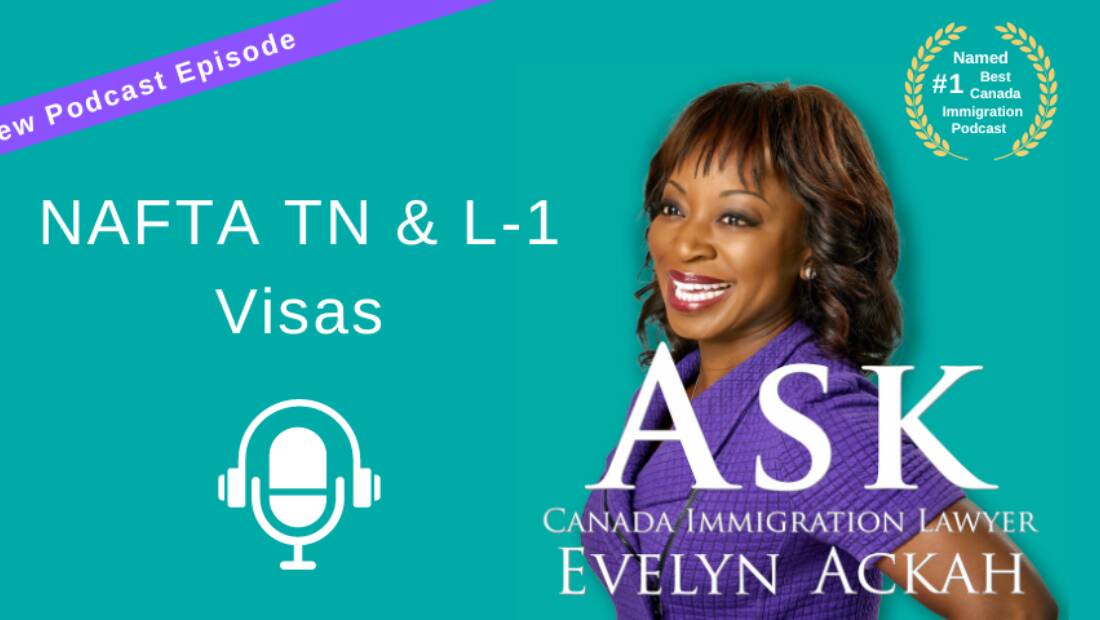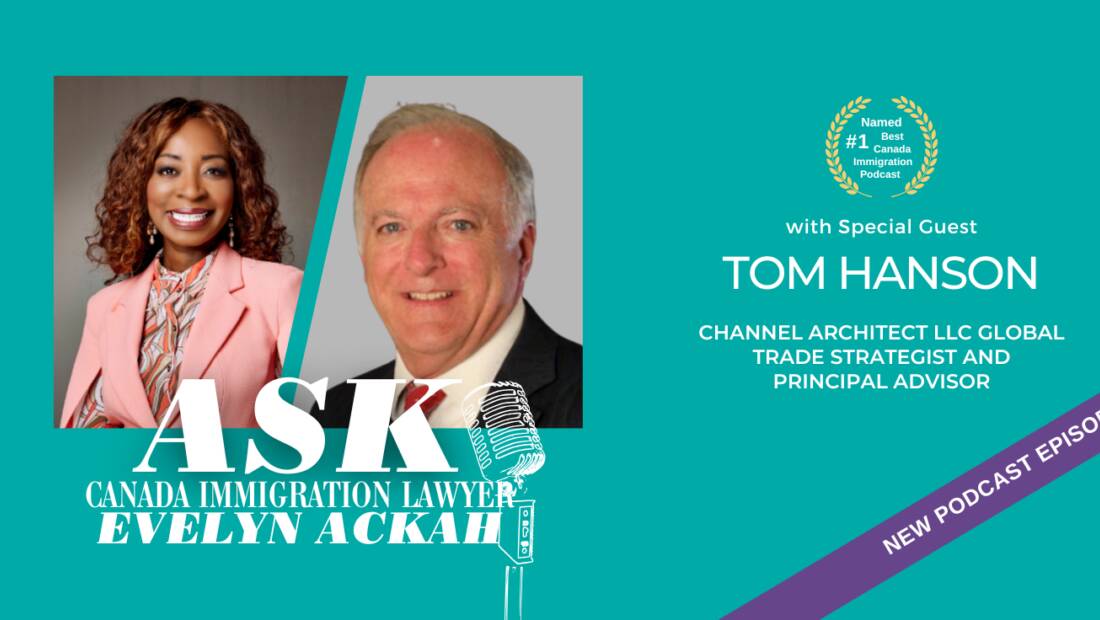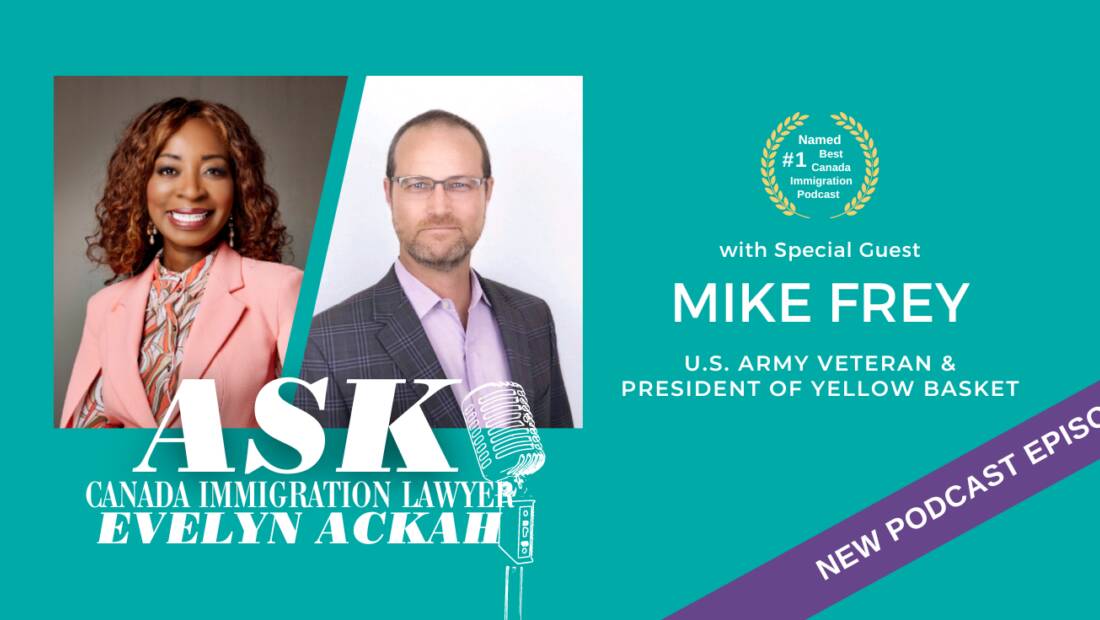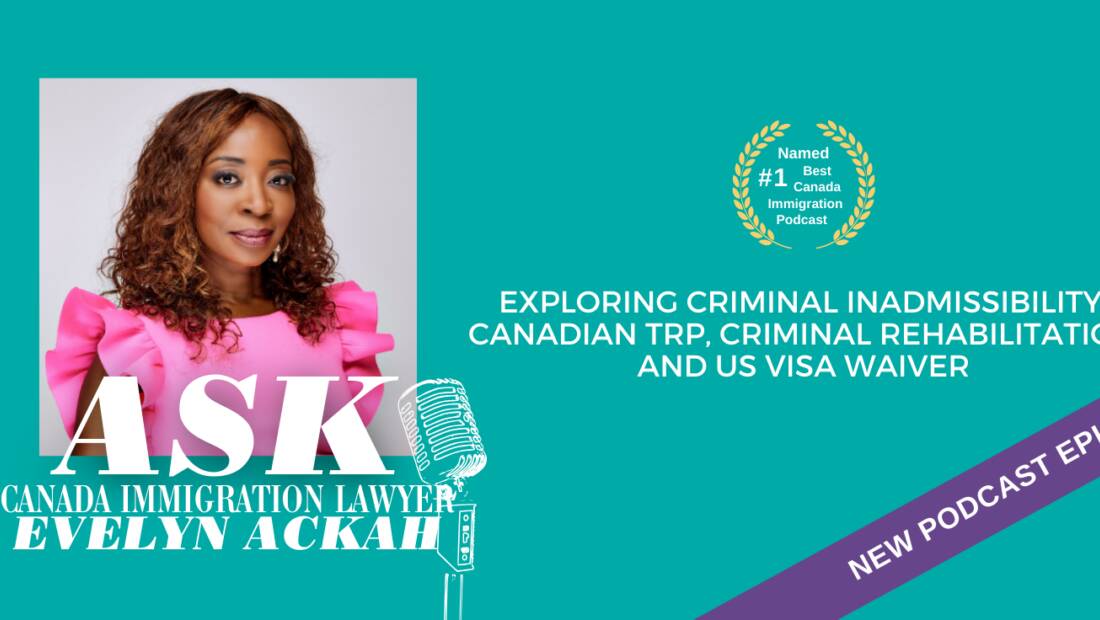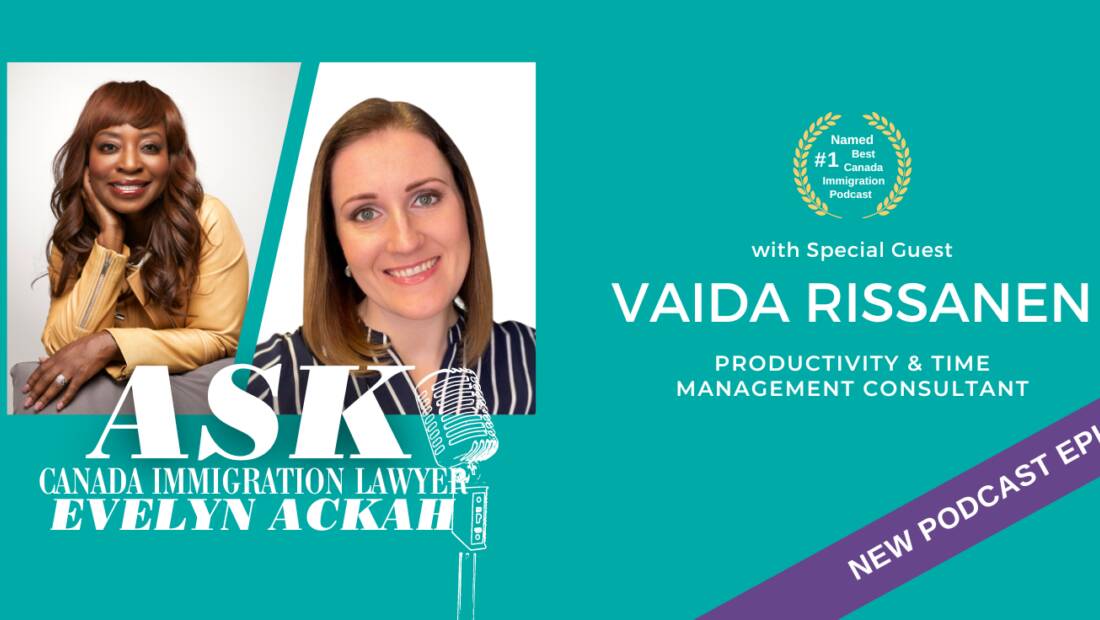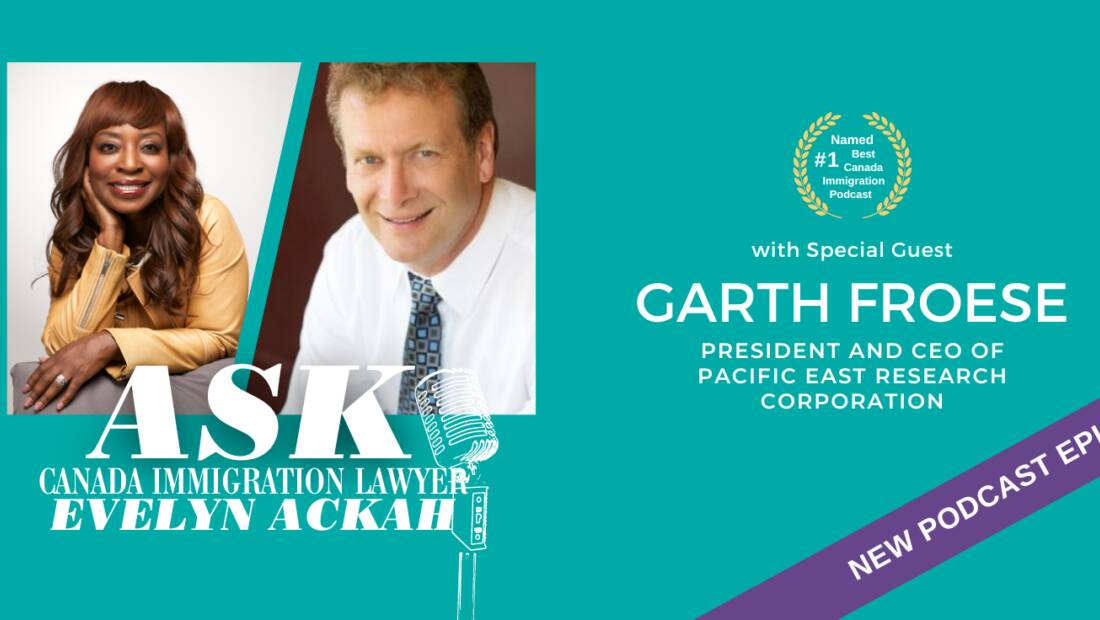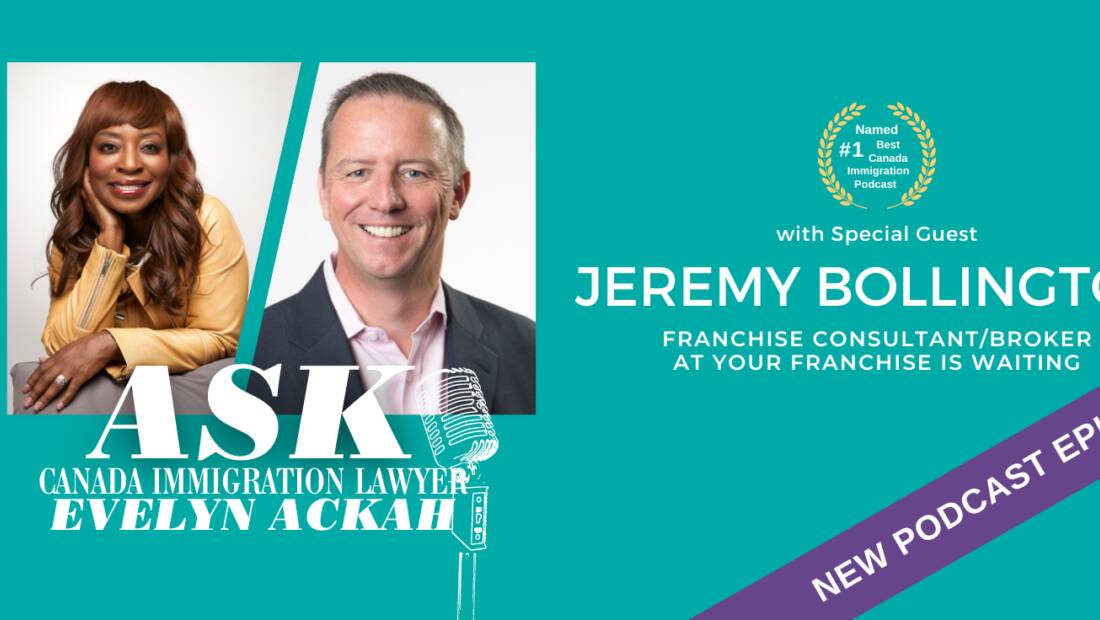Or listen on your favourite podcast app
BOOK YOUR FREE CASE EVALUATION
Calgary immigration lawyer Evelyn Ackah discusses NAFTA visas: the quickest way for Canadians to get a U.S. visa, presented as a live webinar. She shares valuable tips and tricks to maximize your chances of approval and avoid common mistakes that can lead to visa denials, including
- Eligibility requirements for the NAFTA L-1 and NAFTA TN visas
- How to prepare a strong application package to present at the port of entry
- Key differences between the NAFTA L-1 and TN visas
- Strategies for overcoming common visa application challenges
- And much more!

About Evelyn Ackah
Evelyn Ackah is the Founder and Managing Lawyer at Ackah Business Immigration Law. We work with individuals and business owners from all over the world who want to cross borders seamlessly. For more information on immigration to Canada or the United States, Ask Evelyn Ackah at Ackah Business Immigration Law today at (403) 452‑9515 or email Evelyn directly at contact@ackahlaw.com.
The Ask Canada Immigration Lawyer Evelyn Ackah podcast by Calgary Immigration Lawyer Evelyn Ackah was named #1 Best Canada Immigration Podcast in 2022 by Feedspot.

Transcript
Evelyn Ackah:
Hello, everyone. This is Evelyn Ackah from Ackah Business Immigration Law. I am pleased to welcome you to our webinar today on NAFTA TN and NAFTA L-1 visas. For those of you who are here with us live, thank you so much for joining. And I know that this is being recorded so we can share it externally with others after and replay it as well for the Ask Canada Immigration Podcast that we have for Ackah Law. So, look forward to hearing it and getting all your feedback shortly. I'm going to share screen now so that we can get started on the presentation. So, today, again, as I said, we're talking about NAFTA TN visas and L-1 visas under NAFTA, from application to approval, some tips and tricks I've learned after 23 years of practicing immigration law, focusing exclusively on businesses and professionals and educated people.
This is the overview of today's presentation so that you have a bit of a roadmap and you understand exactly where we're going and what we're doing. There'll be an introduction briefly about Ackah Business Immigration Law. We're going to focus on the new NAFTA and we'll talk about the various acronyms for it. We'll then focus on NAFTA business visitor, NAFTA professional, the NAFTA management consultant and engineer category, and the NAFTA intercompany and L-1B and L-1A categories, and then we'll wrap up with some practical pointers for crossing borders seamlessly.
All right, introduction. This is me and I didn't even realize I'm actually wearing the same thing today. I'm going to stop share so that you could see it. So funny. I didn't realize it when I was getting dressed today, but I guess I'm wearing the same purple suit. I seem to like it so much. But anyway, I wanted to give you a little bit of overview about me and the team at Ackah Law. We are comprised of a highly experienced and passionate immigration group of lawyers and consultants and legal professionals, and we provide immigration advice and guidance to businesses, professionals, and their families to support relocation to Canada from all over the world, as well as from Canada to the United States. These are my contact details. Feel free to contact us if you have any questions at all after this presentation of the webinar.
So, we're going to talk about how to cross borders seamlessly. There's somebody else joining, one second. Immigration rules and regulations can be very frustrating and confusing. They're always stressful and they're always changing. This is something that you need to be aware of. And for more than 23 years, I have been focused exclusively on cross-border immigration law for professionals, corporations, family members, and educated people. The goal of the Ackah Law team is to simplify and expedite the immigration process so that you can move to new opportunities in the United States or Canada. Welcome to our new person who just joined the webinar. Thanks so much for joining.
So, we're going to focus now on the new NAFTA and it's called the USMCA. Let's go back. I'm going to show you this. So, if you're going into the United States, the US Immigration wants us to reflect the name the US-Mexico-Canada Agreement. But if you're coming into Canada, we refer to it as CUSMA, the Canada-US-Mexico Agreement. So, it's just kind of crazy, but depending on which direction you're heading, we revise the name accordingly. I'm just still calling it NAFTA because it's been around since 1994, just calling it the new NAFTA. The original NAFTA agreement was established in 1994, and the whole focus was to support economic and trade relationships between US, Canada and the United States and Mexico, I should say. And on July 2020, the USMCA or the CUSMA, it came into force. And as you know, I call it the new NAFTA.
Many highly skilled professionals are looking south for new opportunities and NAFTA makes it possible for them to work in the US or work in Canada. One thing we must highlight is that you must be a citizen of Canada or Mexico to qualify for TN visa. You cannot be a permanent resident of Canada and qualify for NAFTA. So, that's really important. One thing I also want to mention is that the new NAFTA kept all of the professional designations and categories that the old NAFTA had, so that was really important. There's been very little change with how the work permit categories are implemented. What did change really was the trade relationships and the ability to appeals if there's trade disputes between the three countries. But for workers itself, very little was impacted, which makes it great for those of us who do this type of work every day.
All right, so now we're going to get into focusing on NAFTA as the new NAFTA. And so, NAFTA is the preferred method to facilitate cross-border movement. I use it almost every day in my business between Canada and the US. So, for Canadians going down, we're going to go through the temporary entry requirements for NAFTA. And just know that coming into Canada from the US and Mexico, we have very similar categories. They might be called different things, but we have the same cross-border provisions, whether you're going to Mexico or the US or into Canada. So, the three main categories we're going to focus on, again, these are all temporary categories, is the business visitor category, the professionals TN visa category, treaty NAFTA category, or the intercompany transferee category for L-1 visa holders, which is what it's called.
So, we're going to focus on NAFTA business visitor, the B-1. They call their business visitor visa the B-1 and the personal one is called the B-2. And most people in Canada don't realize that when they actually enter the United States, they're getting a visa, because sometimes they don't even stamp our passports. But they don't realize that they're actually entering the United States and they're getting a bit of, we call it a virtual visa, because you don't really get anything. If you're coming from another country to the United States and you want a B-1 visa, you actually get something put in your passport and you know have a B-1 or a B-2 for tourism. But for us, we usually just cross in at the airport or the border and you've gotten your visa. That's how it is for Canadians and that's the benefit of NAFTA.
So, here it outlines the B-1 business visitor category is intended for short-term entry, business meetings, training, sales activity, job search activities, interviews, attending trade shows or conferences. That's really what the B-1 visa is for and you cannot be engaged in work and you cannot be paid in the US. So, let's say you want to go down and focus on finding employment, you can go down if a maximum of six months to do B-1 activity, but you have to really impress upon the officers that you have no immigrant intention if you're staying that long. We usually recommend not to stay very long.
The other thing is you must ensure as a business visitor that you prepare your people and that you are prepared. Because many people think that going across, you just say what you are going to say and that you'll be a allowed entry. But you have to be prepared. You need to understand you are getting a B-1 visa and you are crossing the border and you need to satisfy immigration. You need to satisfy immigration that you have no immigrant intention, you're not abandoning Canada and that you plan to return. We always say go with a return ticket. Don't go with a one-way ticket, have a return ticket to prove you're coming back successfully and that you have a short-term intention and you're not working.
The other thing we always highlight is I think that you should always have a letter when you go to the United States. If your employer is sending you to the US, you must have a letter that also further confirms the reason for your cross-border business travel. It needs to support the verbal submission that you're making. So, a letter from the company you're going to visit, if you have an interview, or the client details, if you're meeting a client to talk business, or you're meeting your existing team that's in the US because you have a team in Canada as well. The most important thing when you deal with crossing the border is knowing what to say and what not to say.
So, if you see what's in bold underneath there, you must never say you are going for work if you are entering as a business visitor. You cannot work without a work permit in the US, and immediately they'll see that as a four letter word and you'll be put into secondary and screened. So, work is not what you say. You keep it simple and you say, "I'm going for meetings. I'm going to train. I'm going to attend a conference." For instance, I'll be attending a conference later this month I'm speaking at. I'm going in as a B-1 business visitor and they say, what are you doing? I'm speaking at a conference for immigration lawyers. How long will you be there? Three days. Great. They know that I'm going for a short term purpose and that I am not doing work. Very important.
So, now we're going to focus on the NAFTA professional TN visa category. This is the one that we use the most. So, in terms of going to the US, if we can use NAFTA, we always will use NAFTA to the best of our ability. Oh, somebody else is coming in. I'm letting them in. So, the TN visa is a NAFTA professional category that allows you to work in the US. So, this is a work permit, the TN NAFTA. And generally, you can get a TN visa for three years at a time. However, sometimes depending on the type of visa you have, you may not be able to stay that long. And so, we need to make sure that everybody understands the purpose of your entry and maybe why you can only get one year. So, I'll talk about that as well so that everybody knows that why.
And if you haven't already, could you please turn off your microphone so that we're able to focus on the presentation? Thanks so much. So, one thing I want to stress is that the NAFTA is focused on education. Very, very important. That's their real focus. If you have a four-year degree, you'll likely qualify for a professional category, so long as you're on the list of professions. And I'm going to go through them in the next few slides. You must be exercising the skills of the profession when you're going into the US to work and you must have a job offer or a contract. So, there are a number of them here, including engineer, scientific technician, technologists.
There are a couple categories where you do not need a four-year degree, and I'll highlight those for you as well. Manager, director, president, those are not positions under the NAFTA professional that they consider to be categories. So, this is one of the lists we're going to go through. This is all the types of NAFTA professionals. And the way the TN visa works is you must have a job offer. So, if you get the job offer, which is great, if you've been networking down in the states and you get an opportunity to work or you get an opportunity to transfer for a company for instance, that has a US entity under these professions, accountant, architect, computer systems analyst, economist, engineer, we use a lot here in Alberta, to send engineers to the US. Even hotel managers is so interesting. These are very old school professional designations.
And then they have teachers, like college teacher, seminary teacher, university teacher as well. So, there's more on that list will go through. The technician technologist, social worker, there's a lot here, and lawyers on the list, doctors are on the list. But you'll notice that a number of other professions are not on the list and this is because they have not updated the list for decades. I think in the last couple years they added a computer systems analyst about seven years ago. They've added a couple of professions, but most of them have stayed the same. And that is a problem, because in my mind you're not able to really show that they've progressed with the change of the new economy and the new job opportunities that are available.
So, before I go further into the TN designations, I want to just highlight there are a couple categories where you do not need to have a degree. One of them is the technician technologist, the scientific technician technologist. This one you need a two-year diploma. And so, we use this a lot for people who might have tons of engineering or scientific technology experience, but they don't have a four-year degree. That category allows you to get a TN, so long as you can show that you are working in collaboration or under the supervision of that degreed professional. It's really important. And so, that degreed professional is somebody who already, let's say an engineer that actually has the four-year degree. So, that's one opportunity that you can use for somebody who doesn't have four years.
The other one that I'm going to focus on too is the NAFTA management consultant for TN. This is the one I always say that's the most abused because everybody who doesn't have a degree, but lots of experience, you must have at least five years work experience, believes they qualifies a consultant. And it's not that easy to get. So, we're going to talk about that as well. That consultant one is probably one of the ones where you may not get three years because you need to show that you're arm's length, you're providing guidance to the leadership of that US entity and you're not an employee. You're invoicing for your time that you are spending consulting and advising.
So, take a look here. The NAFTA professional TN is not a dual intention visa. What that means is that you can't very easily flip it from TN to green card. There's got to be steps along the way before you can qualify. So, the TN visas, they're not dual intention. We have to usually go from if you want to stay in the states, from the TN visa to the H-1B, which is dual intent visa category, and then to the green card. So, that is a long process. It's not automatic and it's not fast. And you should know that there's no limit on the number of TN visas you can get annually. It's different from the H-1B visa, but there's no cap. So, for instance, I have friends who've been in the US for 20 years on a TN visa, because wherever they work they're not able to actually get the green card sponsorship.
So, every year, or every three years I would say they renew their TN visa at the port of entry, and that's one of the benefits for Canadians is we're able to do that. So, that's really great. The other thing that I think we need to focus on is that this is a list to qualify for the NAFTA professional or TN status. The intended US activity must be in a profession that is listed in the Appendix 1603 under NAFTA, and you must possess the credentials. So, you must actually be performing the professional level activities in the US. And as I said before, almost all of the professions listed require a bachelor's degree or higher. And these are the exceptions. The management consultant, the scientific technician technologist, the technical publications writer and the medical lab technologist, they don't require four-year degrees, but they do require two-year diplomas.
So, when as I was saying, a lot of people, even dancers and people who are artists, people who don't fit into the ideal professional designations, they often try to fit into the NAFTA management consultant category. And so, if you don't have a bachelor's degree, you may qualify for this with showing that you have five years experience in consulting or a related field. So, that means that you're providing services direct towards improving the business operations, economic performance of the business, and that you are guiding the leadership in that role, and that you're arm's length from other employees, meaning your job is to advise, your job is not to implement. So, people need to really understand that. It's very, very important.
The NAFTA engineer, this is another category which is great. As I said, we use it a lot where you have an engineering degree. And it doesn't matter what kind of engineer, it can be any kind of engineer, so that you can qualify for it so long as you have a job offer. And so, in that case, you're able to apply right at the port of entry with your job offer. You must actually have your original documents, your degree with you. But keep in mind, for the NAFTA engineer, you do not need to be qualified as an engineer in the US. You don't need a PNG, because you may not be the one that signs your work. You'll probably have a US license and qualified engineer, but you can still qualify on the immigration side as a TN visa engineer.
So, one thing I want to just talk about quickly is the consultant, because this is the one, as I say, if you don't have a degree, many people try to fit into that. So, the consultant TN visa, you must have a consulting agreement that outlines what you're going to do, how much you're going to get paid by the hour, by the day, by the week. It must reflect that you are going to be invoicing the client and getting paid, and you are responsible for your taxes and benefits and all that. You're not an employee. And as I said, I usually ask for two years, is the most initially because asking for three, which is a typical TN, starts to look like you really are an employee and they don't like that. You also need to know that this is the most refused application type under TNs.
So, I really, really recommend if you have the opportunity to apply for a TN, don't do it by yourself. Work with a professional because there's so many steps and preps along the way and things you need to say to be successful. We don't want you to have a problem. The challenge is too, once you have a refusal of your TN application, it's so much harder to fix. So, we want to make sure you do it right the first time. We'll get into more details as we go forward. Alrighty. I want to always tell you that when it comes to US immigration, they always require original documents. It's very important. So, that means you must always provide originals. We always include, of course, your passport. You always must have an employer support letter or an original job offer letter, both original on letterhead of the company signed in blue inc with wet signature. That's what it means.
You also must have, if you're working with a lawyer, an original legal submission letter. So, when we do these applications for our clients, we courier them if they're not local, our legal submission letter, and we also prepare the employer support letter that they then sent to their employer to put on letterhead and get signed and currier back in blue inc. They must have their original degree if they're qualifying for the category for a degree. Even if it's framed, that first time you make your application, take it off the wall, literally put it in a briefcase and bring it, because the US doesn't seem to recognize anything that's not original. It's very old school, unlike Canada.
If you have university transcripts that show you completed your program, we say bring them as well, and you'll need a resume. Sometimes if you were educated outside Mexico, Canada or the US, you might want to get an education evaluation to confirm that the degree you have, let's say your degree from India, it's the same value degree in Canada or the US. And also if you are doing let's say the management consultant, we'd like to see reference letters and experience letters to prove your expertise in the field. So, the NAFTA TN is always submitted at the port of entry for Canadians. This is one of the value adds of being a Canadian citizen, is we do not have to be processed at the consulate, which would take long time.
Only Mexican citizens under the USMCA are required to apply at the port, sorry, at the consulate. They cannot apply right going into the US. Whereas for Mexicans coming to Canada, because they don't need a visa any longer, they can apply at the Canadian port of entry. One thing we always tell you is you must choose the right port. You must never go to the Coutts, Montana, Sweet Grass border. It is the worst boarder crossing in Canada. So, these are some of the tips when it comes to knowing where you want to go and where you want to avoid. Very important that you choose the right port, because again, being refused could be very difficult for you and it's hard to fix after the fact.
These are some more tips about making sure that your TN visa application is as strong as possible. The employer support letter, which is separate from the job offer letter or the employment contract, must list the category you are going to qualify under, and it provides an overview of the company that's employing you, and your eligibility for the TN category, and provides compensation what you're going to be paid, as well as a description of your job duties. It must have this content. And it also lists the length of period of the proposed engagement. We always like to say, it's a permanent position and ideally this is full-time permanent position, that's what you want most of the time. And if there are any special port of entry instructions you need to know before you go, we always recommend having your employer in the US available for a phone call at the time you submit your application, just in case they want to verify and call.
Occasionally, they will do that. So, make sure you have the direct phone number and that you've prepared the person for your US employer so they know but to say and they know that they might be getting a call. The one thing about the TN visa is that it does not allow for accompanying family members to work unfortunately. So, in order to come along as a dependent spouse, you usually have to be married. In the past, we've done it for people who've been common law, even have children together, but that spouse does not get a TD. They would only give that spouse a B-1, B-2, a business and tourism visa for the period of time of the TD visa holder. So, the US still has a whole thing about being married. They don't recognize common law really. So, it's important that you know this. But also the spouse cannot work unless they get their own US work permit.
And you can bring along unmarried minor children that are 18 years of old and under to go with you, and you have to provide evidence of either a marriage certificate and birth certificates. So, it does allow children to attend school. So, this is something to keep in mind. We're going to focus now on the NAFTA L-1A and L-1B visa. We use this a lot in our practice. The L-1 is the intercompany and it's really great because it's based on a Canadian business that's been operating already, and for at least one year, or you've been working for the Canadian entity for at least one year. Then you create your US entity and you're able to transfer the work in the United States to grow the business on the US side. And so, that is really a great option.
The L-1A is for managers and executives and the L-1B is for specialized knowledge workers. So, we'll delve deeper into that as we move forward in the presentation. All right. Here we go. So, the L-1A is for executives and managers. And this is the definition of executive. The executive must direct the management of the company or the organization. They set the goals. Oftentimes they deal with profit and loss responsibility, they hire and fire, and they exercise lots of latitude in terms of being able to guide the business. That's a big thing that an executive must have. So, one thing to consider is, because Canadians can do this application at the airport, we're very successful with the packages, making sure they're perfect. The challenge is usually if you want to stay in the US longer and you want to convert to green card, it makes it more challenging in order to get flipped into green card. So, we'll talk about that as well.
The next category under the NAFTA intercompany is still the L-1A, but this one is also for managers. So, the L-1A is for managers and executives. So, a manager may not be the C-suite, but they must manage the organization or a department or function, they must supervise and control, and managers, and professionals, and they must possess authority to hire, fire, recommend these actions, and they function at a senior level. So, let's say your job is the department manager in Canada and you're moving to the US to work as a department manager in the US, that would be an L-1A. We would focus about your discretion over day-to-day operations and the employees that you have authority over. That would be the L-1A qualifications.
One thing that has recently been introduced in the last, I think it was maybe seven years, is this concept of functional manager. Functional managers must manage essential functions in the company, but they might not necessarily manage staff. They might have manager in their title and they may provide something indispensable or have important knowledge or service that helps the business, but they may not actually manage anybody. And so, they will still qualify for L-1A so long as we meet all the criteria and outline why they qualify. And we choose this one instead of the L-1B, because sometimes you can go both ways.
So, now we're into the NAFTA intercompany L-1B, which is the specialized knowledge worker category. This is a category focused on specialized knowledge. Specialized knowledge means that they must possess knowledge that is valuable to the employer, it's competitiveness in the marketplace. Sometimes they have information or experience that is unique to the company, something that they've trademarked that is unique to that organization, processes, procedures that are highly distinct from other operations that make them specialized. So, they must be uniquely qualified and that they are bringing that specialized knowledge into the US marketplace that is not easy to find, you can't just find it on the street, and it will help the business be competitive and grow. So, that is specialized knowledge.
The specialized knowledge is one that I find we always have to really delve deep. If they are proprietary materials, proprietary training, manuals, technology, things that are trademarked, things that they have patents on, really unique that makes them specialize. If they have equipment that's unique and specialized, you have to highlight it as much as possible because you want to be successful. And the L-1B is one they look at very closely to be able to explain why. The other thing is we use the L-1B a lot for people who don't have education, but they may have really unique skillset and that specialized nature. You don't need to have a degree for either the L-1A or the L-1B, but for the L-1B we really have to stress why they want this person and that is the thing that's the challenge. Generally our L-1 applications are like a inch thick, if not more, because we put so much information in to satisfy the officer about the legitimacy of the company, the job, the duties, and either the executive or specialized knowledge.
So, now we're going to go into practical pointers. So, these are things I want you to think about. Again, I always recommend you work with a professional, work with a legal professional. It's hard when somebody comes to me after they've been refused because they put something together on their own and they didn't understand fully what they're doing. But things to work on and think about are ineligibility due to criminal convictions or prior refusals, ineligibility due to medical and admissibility. It's very challenging to even know what would be medical inadmissible. However, there are some cases where if you're very, very ill, they may have some challenges with letting you in.
Make sure you understand the visa requirements. And if there are any medical requirements, that you understand what they would be. And then if you're bringing a company dependent, make sure you've got all the paperwork to prove that you're the parent or the guardian. And sometimes even if children say one parent has custody and you're taking one over the border, they're highly, highly suspect. You need to make sure you get a letter, permission, all of that, otherwise they think you might be kidnapping a child. And so, both sides of the boarder are very sensitive to that situation. So, your job when you're making your application is to look the part of the professional. I always tell people to dress like you're going for a job interview. Take it very seriously. Get to the airport three hours before your flight, at least.
Know what you're doing. Know your itinerary. Be very, very courteous and very charming and only answer the questions they ask. Be honest, do not talk too much. Sometimes people can talk and talk and talk, and they talk themselves into trouble. So, you don't want to do that. You must have your supporting paperwork with you ready to show. So, what happens when you get to the airport is you'll be in that customs line, in the immigration line and then you tell them you're applying for a TN or an L-1, and they will direct you to the office. And that is where you'll be getting your work permit processed. And I always recommend you travel between business hours, Monday to Friday, during the week if possible, during business hours where you've got more people on staff that know what they're doing and more experienced people on versus the weekends and the evenings.
The other thing I'd recommend is if something goes wrong and they think you're missing something or it looks like they're not happy with something in your package, rather than pushing them where they can just say, fine, we'll let you in as a business visitor, and they won't, or they'll give you a refusal, just ask if you can withdraw. Withdraw and say, well, that's fine, I'm going to go back and talk to my lawyer, I'm going to go back and see what I can do. I'd like to try this again with the information that you've asked for so that it's complete and you don't have a refusal on your hands. So, that essentially is the end of our presentation.
If anybody has questions, I'll be happy to answer some of them with the time that we have, just giving you an overview of the cross-boarder immigration services we provide at Ackah Law. And this presentation will also be sent out to you following this so that you can also continue to communicate with us and you can review it again if you have any questions or concerns. So, that's it for me. Is there anybody here that would like to ask any questions? I'm happy to provide some free advice while we have time.
Speaker 2:
Hello. Hi, this is [inaudible 00:34:08] here. Thanks for the amazing presentation.
Evelyn Ackah:
Thank you.
Speaker 2:
I have a question regarding the N-1 visa category. I'm an independent consultant who is based in Vancouver, BC, so I have a company incorporated here and I also incorporated a company in State of Florida. So, I just wanted to know that is there any minimum requirements for the company who is sponsoring, let's say I just want to send my engineer to Florida for the L-1 category, he is the manager, like a CTO. So, is there any requirement on my side as a company to have some minimum requirements?
Evelyn Ackah:
Okay. So, let me just get this clear. You have a business, do you have more than one employee more than yourself?
Speaker 2:
I work with contractors, so I have one permanent employee.
Evelyn Ackah:
So, this is where it gets a little challenging, because when you are an employer and we basically are self-employed, the L-1 is a hard one. Because the plan is you're supposed to keep the business in Canada operating with staff while you've got your Florida business and you're going to transfer that person. And the goal is to grow the US business. So, if you're really, really small, sometimes you might get some pushback. I've done it. You really have to build up the business in Canada and explain what the plan is in the US. And you have to continue to show that the business in Canada will still be operating.
And so, that is the thing. And sometimes revenue numbers, because you have to be able to show you can pay the person in the US. So, you hope that the business will be a going concern and it's got a good revenue base. But there's no specific criteria except that both businesses have to be in operation. You can't just say I'm going to move to the US as an L-1A and then you shut down everything you're doing. That that is not in the intention of the L-1 category. Do you understand?
Speaker 2:
I understand. I got it.
Evelyn Ackah:
So, for your CTO, I mean one option is they can go down as a TN under your US entity. If they're an engineer, they can go down even if they're doing other duties besides-
Speaker 2:
The thing is that, that US entity is not operational, it's like just incorporated for the L-1 purposes. But the thing is that, as per US immigration law, you cannot sit outside the US and run a company. You need to have a visa. Isn't that true?
Evelyn Ackah:
Yeah, you do. I mean I don't know what you mean by that. I mean it's hard to run a business. You can do it remotely, but the issue is they don't consider that you're really running the business because you don't have somebody on the ground.
Speaker 2:
Yes. So, if I incorporate it in the US and I'm sitting outside and running that business, is that legal in terms of US immigration?
Evelyn Ackah:
It's legal, because you're not in the US, it's legal because you're doing it from Canada. So, I guess the issue becomes, and we should probably do a consult, it's like how are you going to operate? Are you going to sign contracts that are US contracts? How are you going to provide the services? It's legal because you have not entered the US labor market. That's when you need your work permit. Because you're doing everything remotely in Canada, there's nothing wrong with that. But I also recommend people always talk to a tax advisor too, because there still may be tax obligations you'll have because of how you're invoicing your US based clients. So, definitely, tax drives immigration as well.
Speaker 2:
Okay. All right, thank you so much.
Evelyn Ackah:
And if you want to talk later, [inaudible 00:37:43], you can always contact my firm and we can have a quick call. Thanks so much for participating. Is there anybody else with a question before we wrap up today?
Speaker 3:
Yes, hi, this is [inaudible 00:37:56].
Evelyn Ackah:
Hello, how are you?
Speaker 3:
Yeah, yeah, I'm good. How are you?
Evelyn Ackah:
Good, thank you.
Speaker 3:
Yeah. We were discussing about the education evaluation for while applying for TN. So, I wanted to confirm should the education be equal into US degree or Canadian degree? Let's say my degree is from India and if I would like to apply for TN, so the documents which I get evaluated, should they be equal into Canadian degree or a US degree?
Evelyn Ackah:
Oh, it can be either. I would do it for Canadian, because they recognize Canadian degrees. So, it's no problem. It's just when it's foreign. I'm from Ghana, originally, from Africa, it's like we'd have to do it again. So, you're basically going to do a west assessment. And I have to tell you, are you from India?
Speaker 3:
Yeah, I'm from India.
Evelyn Ackah:
So, most of the time, which is great, they've highly educated, the education system is viewed exactly the same in Canada and US. So, you do need the west, because I want to make sure that you would not have any trouble being any pushback when they see that. So, it's worth doing and I would do it in Canada. It doesn't need to be US, because any education in Canada, US or Mexico, is treated the same. So, if you can show the evaluation, you're good to go.
Speaker 3:
Thanks for that.
Evelyn Ackah:
Okay, you're welcome. Thank you. If you have any more questions you can reach out to us. Anybody else before we wrap up the webinar today? And I'd like to thank you for joining us. And if you know that where we can be reached, our information is available and we'll be sending you the webinar. As I said, feel free, we do consultations at Ackah Law, even 30 minutes, because we want to make sure if you have questions, you get the answers you need and not make a mistake. It's much harder for us to fix. So, that's it for us. Thank you so much. I hope you continue to follow us on social media. And if you have questions, we look forward to helping you. Take care everyone, have a great day. Bye-bye.
Speaker 2:
Thank you.

